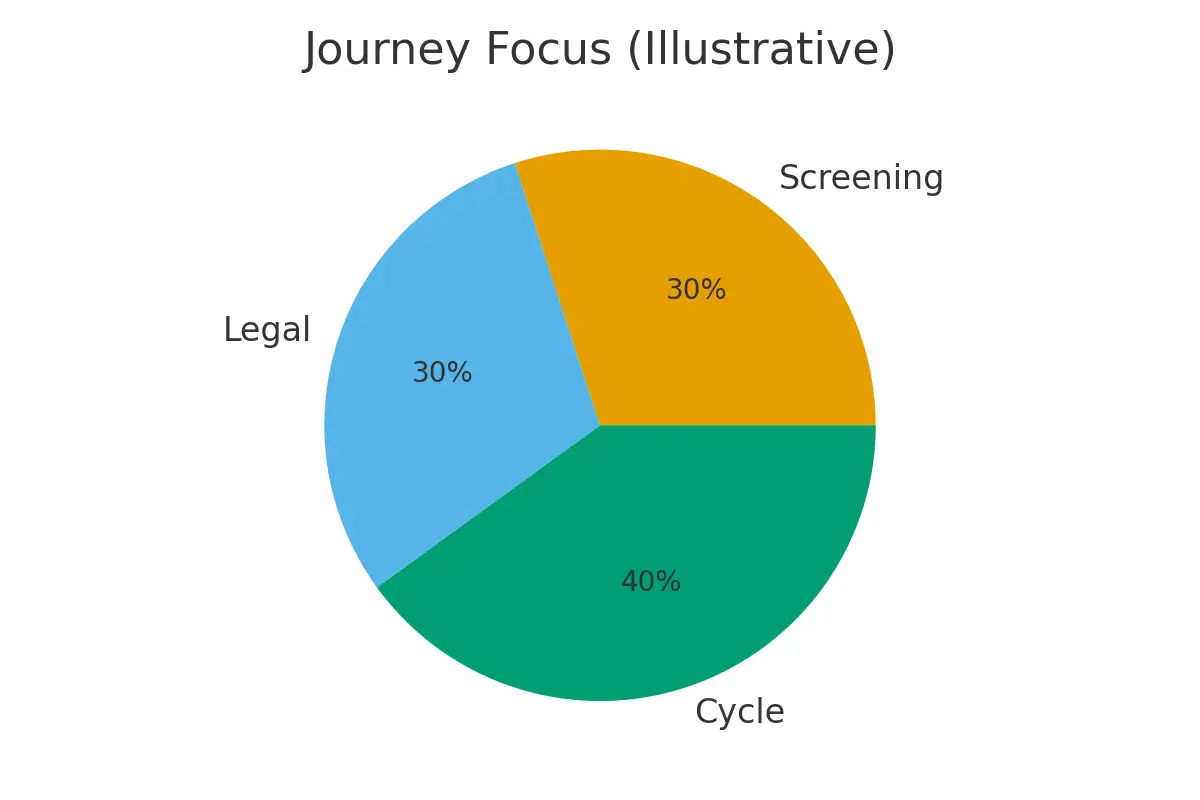
When building a family through donor eggs, embryos, or sperm, many intended parents feel overwhelmed by the number of people and organizations involved. Clinics, agencies, labs, and legal partners each play different roles—but the boundaries are not always obvious. This article explains who does what within the Donor Options pathway, so you can make practical choices that improve outcomes, protect budgets, and keep timelines predictable.
What It Is
At its simplest, the clinic provides the medical expertise and procedures, while the agency manages donor recruitment, matching, and coordination. Legal and financial professionals often step in to create clear contracts, manage escrow accounts, and prevent disputes. When aligned well, these partners form a team that helps you move smoothly from donor matching to embryo transfer. When roles blur or overlap, however, patients may face delays, stress, or unexpected costs.
Who It Helps
Understanding clinic and agency roles is particularly helpful if:
- You’re using donor eggs or embryos and need long-term coordination between providers.
- You have complex medical history that requires multiple checkpoints.
- You’re considering international donors or gestational carriers, where logistics multiply.
- You’ve faced cycle cancellations or delays and need clarity on accountability.
- You’re balancing budget certainty with flexibility, especially when insurance or pre-authorizations are involved.
Families with straightforward cases may glide through without much confusion, but for most, mapping who-does-what saves both money and heartache.
Step-by-Step:
- Consultation – Clinic reviews labs, imaging, and history; agency introduces donor options.
- Donor Match – Agency recruits, screens, and presents candidates; clinic confirms medical eligibility.
- Legal & Consent – Lawyers finalize agreements; consent forms align with clinic policy.
- Cycle Planning – Clinic sets stimulation protocol, retrieval date, and monitoring cadence.
- Embryology – Fertilization, culture, and (if chosen) genetic testing occur in the clinic’s lab.
- Transfer & Follow-Up – Clinic performs embryo transfer and monitors early pregnancy; agency steps back unless future donor coordination is needed.
This checkpoint structure ensures accountability is clear at every stage.
Pros & Cons
Pros of clear role division
- Predictable timelines and reduced duplication.
- Stronger donor and patient protection.
- Easier financial planning when line items are separated.
- Improved communication—knowing who to call when issues arise.
Cons or challenges
- More contracts and signatures to manage.
- Upfront costs may feel higher due to multiple vendors.
- Risk of finger-pointing if responsibilities aren’t defined.
- Extra coordination required for international or cross-state arrangements.
Costs & Logistics
Costs are spread across different providers:
- Clinic: retrieval, fertilization, monitoring, lab testing, embryo transfer.
- Agency: donor recruitment, compensation, coordination fees.
- Legal: contracts, parental rights, escrow management.
- Pharmacy: medications for donors or intended parents.
- Ancillary: storage, international shipping, genetic counseling.
Using a cash-flow tracker that groups costs by provider helps avoid missed bills or duplicate payments. Insurance pre-authorizations also matter—many cover clinic procedures but not agency or legal costs.
What Improves Outcomes
- Clinic calendar alignment: prevents scheduling conflicts that drive stress and costs.
- Transparent legal steps: avoids disputes later about embryo ownership or donor rights.
- Lab quality indicators: choosing a clinic with strong reporting on fertilization and blastocyst rates.
- Male factor and ovarian optimization: small changes here can shape cumulative success.
- Evidence-based choices: avoid add-ons that don’t improve live-birth odds.
Case Study
A couple pursuing donor eggs began with a strong agency but did not clarify how medical screening would be handled. After several months, their chosen donor was disqualified at the clinic stage—costing time and emotional energy. On their second attempt, they demanded a clear division of tasks: agency would handle recruitment and preliminary screening, clinic would finalize medical clearance. This structure reduced surprises, and the cycle proceeded smoothly with fertilization, embryo banking, and eventual transfer—all within budget and timeline.
Mistakes to Avoid
- Assuming the agency will manage medical approvals.
- Forgetting to budget for legal contracts and storage.
- Over-relying on the clinic for donor recruitment (not their role).
- Skipping insurance pre-authorizations, leading to denied claims.
- Ignoring communication gaps between providers until delays mount.
A simple checklist—who is responsible for donor recruitment, medical clearance, legal contracts, finances, and logistics—can prevent most headaches.
FAQs
Q. What’s the main difference between a clinic and an agency?
Ans. The clinic handles medical steps—stimulation, retrieval, labs, and transfer. The agency handles donor matching, coordination, and support services.
Q. Do I need both a clinic and an agency?
Ans. Yes, in most donor cases. Some clinics have in-house donor pools, but independent agencies often provide more options and flexibility.
Q. Who manages legal contracts?
Ans. Neither the clinic nor the agency—this is done by independent attorneys. However, both require signed contracts before proceeding.
Q. Can insurance cover agency fees?
Ans. Rarely. Insurance may cover medical procedures at the clinic but not donor compensation or agency management fees.
Q. What if my agency and clinic disagree on donor eligibility?
Ans. The clinic’s medical criteria always prevail. Agencies may help you find a new match, but final clearance belongs to the clinic.
Clarity is the best antidote to confusion. Schedule your free 15-minute nurse consult, upload your labs for review, and request a personalized cost breakdown. With well-defined clinic and agency roles, your family-building journey can move forward with less stress and greater confidence.
Next Steps
- Free 15‑min nurse consult
- Upload labs
- Cost breakdown for your case.
Related Links

Dr. Kulsoom Baloch
Dr. Kulsoom Baloch is a dedicated donor coordinator at Egg Donors, leveraging her extensive background in medicine and public health. She holds an MBBS from Ziauddin University, Pakistan, and an MPH from Hofstra University, New York. With three years of clinical experience at prominent hospitals in Karachi, Pakistan, Dr. Baloch has honed her skills in patient care and medical research.





